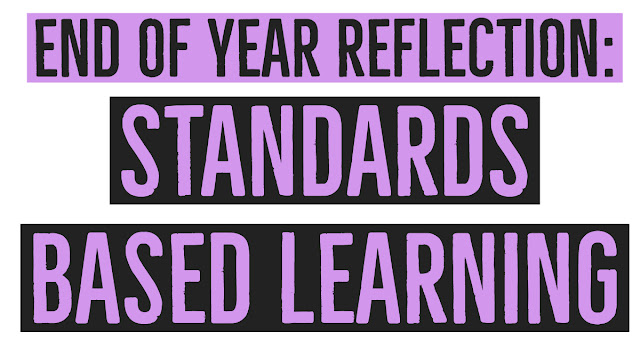Reflecting on the 18-19 School Year: Grading Practices
 |
When I first started the grade reform journey I did not know I would end up going standards-based and what I eventually settled on was something called Reflective Standards-Based Grading. In this type of grading, you work towards learning objectives and students self-assess on those learning objectives with a clear rubric for each standard. They must provide evidence of mastery when they self assess which is typically classwork, quizzes, tests, essays, or projects. They turn this in for summative assessment and are given feedback if they do not achieve mastery of the standard or objective being assessed.
But this last year, I tried things just a little bit differently, I was curious if the self-assessment and reflection were essential to going standards-based and achieving all my goals with my students. If students were getting regular feedback from formative assessments did they really need to self-assess and reflect on each standard? The reflections are a really time-intensive process that requires you to give up class time for it to be most effective and I worried I was sacrificing my time for a practice that maybe wasn't needed if all other elements of my grading practices focused on measurable growth and consistent feedback for my students.
So this year, I focused on an assessment based model of Standards-Based Learning without student reflection. Not much was different in this approach, I still introduced standards as student-friendly learning objectives to students, we worked on them and they received a lot of formative assessments and feedback that was not graded, and then instead of self-reflecting on a rubric they were formally assessed through a test, project, or writing task. They still had opportunities to re-assess if they did not meet mastery and standards were all that went into the grade book.
In order to talk about how this went, it is important for me to explain my goals in reforming my grading practices. First, I wanted students to stop asking me how many points anything was worth, I wanted the focus to be on learning and not points. For this to happen students have to really understand what they are being asked to learn and they need to understand how the work in class aligns to their learning goals. This year, students understood that we had learning objectives and goals we were working towards but they took far less ownership of that throughout the learning process when going strictly assessment based. In reflective grading, students have to analyze their own learning progression, they have to be able to explain what they know and can do and what they need to work on next, that responsibility is removed from them in an assessment based model.
The next big goal is that I want grades to be a clear form of communication of what students know and can do. Assessment based standards-based grading does this, I feel confident that my grade book clearly shows what students know and can do and that all stakeholders reading the grade book can easily access and understand that information. But again, students took far less ownership of their grades and this led to them often forgetting and needing to be retaught how grades worked in my classroom compared to the 5 other classes they saw each day. While I had felt that reflections were time-consuming I think I spent just as much time reteaching what the grading practices were in my classroom throughout the year and that doesn't feel as valuable to student growth and achievement as student self-reflections did.
Another big goal I had when addressing grade reform was that I wanted an assessment and grading system that supported all learners but I found with assessment based SBG I was leaning more and more towards there being this one acceptable assessment and student choice and student voice were almost non-existent in the grading process. When the assessments become one size fits all, that doesn't support all learners. In reflective standards-based grading students have a voice and are able to pick and choose which work and assignments best reflect their own learning and progress. This makes the process of differentiation and individualized learning a reality when you have classes of 42 students.
Overall, I still think the work I did this year was better for students than what I was doing four years ago but I don't think it is the best I can do. This is part of why I am hosting #sblbookclub this summer is to continually reflect on how I can change and improve to meet the needs of my students and the goals I have listed above.



I want to take this time out to appreciate kelvin for their efforts on my grades. He helped me change my University grades at a very affordable cost and without no delay and did a very good job because the grade change also reflected on my University’s Administration system.. If you’re a student and not satisfied with your grades he can help you change them right from your first year till your current semester. And he helped me catch my cheating fiancé by giving me full access to her messages, WhatsApp, facebook, location and exposed her true intentions. I appreciate Douglas for helping me. His email is kelvinethicalhacker@gmail.com. Signal/Telegram +1(341)465-4599. nm,m
ReplyDelete